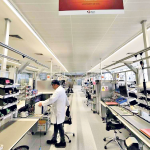Portugal’s lost decade
Portugal lost over a decade leading up to its adhesion to the euro currency in which it failed to undertake necessary reforms to make its economy productive and competitive.
This is the opinion of economist and former Portuguese minister of Finance, Fernando Teixeira dos Santos who addressed the International Club of Portugal (ICPT) in Lisbon on Thursday.
As part of his keynote presentation ‘Meeting the Urgent Economic Challenges for the Necessary Growth of Portugal’, the minister who ran Portugal’s finances between 2005 and 2011 under the PS party government of José Sócrates, prescribed remedies that could have come straight out of the centre-right PSD party economic policy book.
“Our weak growth since we joined the Euro has to do with external factors, globalisation, and the entry of China in the global trade network. We are more susceptible to competition from these kinds of countries which have a pattern of competitiveness similar to ours in terms of cheap labour and more traditional industries, and which outcompeted us in a significant part of the European market”, he said.
However, Portugal’s problem of weak growth wasn’t so much to do with joining the single currency, because Portugal could no longer make its exports cheaper by devaluing the Escudo as it had done in the past.
Rather, it had to do with its incapacity to adjust to a new reality where “we could no longer count on exchange rate policies” because Portugal now could only be competitive if its companies were productive.
“Because we didn’t reform, restructure and modernise our economy and our companies in the 1990s we condemned ourselves to low salaries and low productivity. This is where Portugal failed with the entry into the single currency. We didn’t undertake sufficient necessary reforms that would have enabled our economic system to enter a new paradigm. We were so addicted to exchange rate policies and devaluation that we never managed to free ourselves from this crutch when the euro arrived. It was the great challenge of our time and we missed the boat”, lamented Fernando Teixeira dos Santos.
Between 1986 and 2000 Portugal was a net recipient of tens of billions in EU development funds which, critics say, were not always put to best use in modernising Portugal’s economy away from non-productive traditional industries and towards new technology-based companies. Instead the most visible improvements to Portugal’s economy in these years dominated by the PSD Ánibal Cavaco Silva governments were an extensive motorway network and advanced Automatic Teller Machines.
The devaluation ‘crutch’
In dos Santos’ opinion, what Portugal should have done between 1986 when it joined the European Union, and particularly in the 10 year run-up to signing up to the single currency in 1999, was to focus on productivity through innovation and cost cutting to gain competitiveness.
“When we were unable to do this in the past, our lack of productivity was offset or corrected by devaluing the currency, but his only served to impoverish the country compared to overseas competitors, devaluing Portuguese labour,” said the former Finance minister.
And continued: “We got stuck in a Catch 22 of being competitive through low salaries and impoverishment. If we invest in the levers of productivity, we will become competitive, and at the same time improve revenues through greater efficiency, price quality ratios in overseas markets, and thereby generate more income for the Portuguese”, he said.
Fernando Teixeira dos Santos recently published a book entitled ‘Times Change, the Challenges Remain in which he’ admits that the government he was an integral part of did not “sufficiently deal with” the sovereign debt crisis that Portugal faced in 2010 and 2011 and which led to the collapse of his government and resulted in Portugal being forced to go cap-in-hand to a troika of international financial lenders for a €78Bn bailout.
At the ICPT he freely admitted that a more conservative and less socialist remedy might have served Portugal better.
“Portugal’s structural problems affected how our economy functions and undermined it, making it a liability when faced with international crises”, he said.
“An example was the financial and sovereign debt crisis between 2008 to 2013 which hit Portugal hard because we already had an economy which was fragile and did no inspire much confidence in the international financial and lending markets”, he admitted.
And added: “For decades Portugal has had an external deficit, in terms of import/export, and ignoring three years during World War II when Portugal ran a surplus because of the export of tungsten, we have always run a deficit in trade terms.”
However, since 2012 to date, Portugal’s company focus on exports meant that it has enjoyed a more favourable overseas trade balance, and this is something that could help Portugal turn the page.
Questions such as innovation and technological progress, the effective functioning of the markets, good organisation and models of management of institutions, company sophistication, the streamlining of regulatory frameworks in economic management, reductions in the bureaucracy and tax burdens as well as digitalisation are all factors, he says, that affect the efficiency of the productive system and the productivity of the Portuguese economy.
However, he stressed that digitising outdated processes that don’t work effectively would not change Portugal’s efficiency and profitability.
“We have to reinvent processes both at company and services levels. Digitalisation is not just computers and IT, we have to reinvent these processes. We can’t be improving and modernising systems that were already bad, the challenge of digital transition both at company and public entity levels, means innovating processes and services which are provided to citizens”, said the economist Fernando Teixeira dos Santos.










